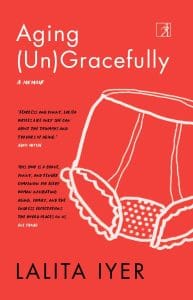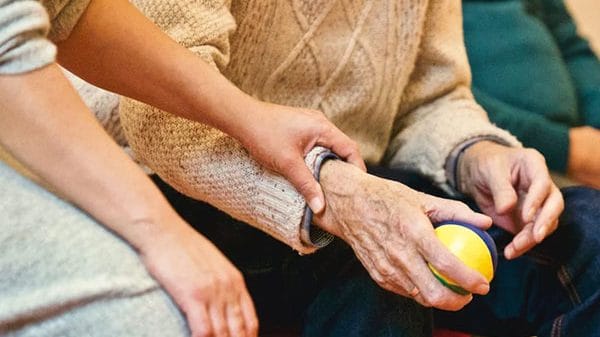I overheard a conversation between two teenagers at my son’s school cafeteria and one of them was talking about a teacher leaving and why he was cool. The second one said, ‘But isn’t he old?’ and the first one replied, ‘He is not old old, he is young-old. He is cool!’
It reminded me of Pam Aldon’s monologue in Better Things where she has a fiery retort to being called a Boomer by her daughter, ‘For the last time. I am Generation X. We are the coolest generation.We can give change without using the computer.We are analogue.We use paper.We are the last golden generation. Don‘t call me Boomer. I hate that!’
Developmental psychologist Bernice Neugarten made a distinction between young-old age and old-old age. He said that as long as we can do most of what we want to do, we are young-old age. When our health fundamentally changes the way we live, we have entered old-old age. Most of us are between these two categories-we can still live as we have, do the things we could do, with slight adaptations. Like me making peace with my backbends in yoga class. And some of my friends who can no longer sit cross-legged on the floor.
Sometimes, it feels like I have entered Adulthood 2: Being an adult, but with more agency.
If you did it right, to have been young once was more than enough. I would never want to do it again. There is a certain grief mixed with nostalgia in the phrase ‘Oh to be young again!’ that I still encounter from time to time, especially when one is at an event filled with PYTs.
But do I want to be young-young again? Nah!
People think it’s harder to be old, but I would never want to be any younger-I don’t miss my 30s, and certainly not my 20s.Yes, the pert ass and perky boobs were great, but what about all the existential angst they came with?
For all the fears and insecurities of getting old, I feel youth is no cakewalk either.
Because, for one, youth is full of fear.
To feel that perpetual trepidation that you will never find a job, a partner, a place in the world, or an apartment that you don’t have to share with two other people. (Will I have kids/buy an apartment/be a good mother/be able to keep a marriage?)
To live with the anxiety that you’ll end up on the outskirts or everyone else will get ahead of you in the game? (Will I be good enough, important enough?) No thanks.
To wonder whether you’ll ever do work meaningful to yourself, let alone anyone else? Not a chance.
To not know what professions to pursue or how to tell the good lovers from the bad ones-to not know whether you can trust your internal compass to lead you home, or indicate a place where you can truly shine?
Also read: DDLJ, Devdas, Shakti—what trains represent in SRK films
I know I am still wrestling with these demons in my 50s (and perhaps will continue to do so in my 60s), but at least they are familiar.
People often say youth is the best time oflife, but having crawled to the other side, I am not so sure. I found my youth exhausting. It was an endless stream of expectations, performances, and checklists. It was as if I were in a constant race, competing against time, against peers, against the invisible metrics of success that were whispered into my ears by family, media, and culture at large. I was always in self doubt, always growing into a certain version of myself, and never entirely sure who I was yet, never fully comfortable in my own skin.
Sure, my limbs were supple, I went through an abs phase, my hair had a shine all the time, my curls sang with product, my eyelids didn’t have lids, and I didn’t feel the urge to fart so much. But apart from that, youth was so hard, so full of turbulence-and while I yearned for the happy moments, I doubted them when they came, because I knew they had an expiry date.
Now in my 50s, there is a gravity-seeking quality to certain body parts, as though there has been a mass migration southwards, but on the other hand, the nonchalance I seem to have acquired about my body is something I value.
In my 20s, I was constantly trying to keep up-building a career, forming relationships, maintaining appearances, and making decisions with a sense of urgency that in retrospect seems absurd. Living in the now was an alien concept then and I am glad it is possible now and actually, simple. At least when you’re 50, you know what you’re doing with your life, even if you don’t like it. Sure, my body is not always in control, and neither is my mind, but I can make choices. I realise that understanding what things meant in hindsight is what makes you wise.
Somewhere in your 30s, you become an operative person and then you meet other 30-year-olds who are actually thinking, ‘OH MY GOD! I AM 30 ALREADY, WHAT
AM I DOING WITH MY LIFE?’ And you start thinking the same.You realise there is a very small window to make all your big career moves, plus find a partner, plus constantly be reminded that your reproductive clock is ticking away. Oh yes! THE CLOCK IS TICKING!
Fortunately, I ignored all clock warnings and motherhood came to me at a time I was truly willing to invest all of myself in it. When I had a child at 41, I knew that the two of us were a unit forever. And in a way, the loss of my marriage made it clear that I had this one job to do, one person to love, one relationship to build from scratch. But my body was letting me down. Pain was a constant, yet I poured myself into a job I had little strength for but wanted to wing it. I spent most of my 40s in airplane mode, floating along, inattentive to everything around me, waiting to cross that border. Nothing prepared me for the wonderment that lay beyond.
So here, now, in this phase of being ‘young-old’, I feel something I never felt in my youth: Freedom. Freedom from trying to prove myself. Freedom from the pressure to be attractive, to be successful, to be productive, to be liked.
I found myself reaching out to see, hear, feel everything. I could hold intimate conversations, access my deepest emotions, and be willing to listen to others as they engaged in theirs (I had the time to do this, as I didn’t measure time spent by how productive I was.)
In my 50s is when my life reached a review mode. I could reclaim my girlhood. I could finally be the person I thought I was. I always knew that I was smarter, more capable and hardworking than all the men I loved. So, yes, I am alone, but I don’t miss them. (It had nothing to do with you, the one who got away, or the ones I drove away, or even the one who stayed.)
But I would have missed me if I hadn’t found her.
Did I have to be single to be my authentic self? Maybe not. But it did help me veer closer to who I was, what I wanted to be, and how I wanted to be remembered.
As for my body—I have never felt better about it, or more grateful. It’s not about what size I wear or how my clothes fit me. I don’t want to say I feel 20, because I didn’t like how I felt when I was 20 or 30 or 40. I am glad that I am not the person I was at 30.
 This excerpt from Lalita Iyer’s ‘Aging (Un)Gracefully: A Memoir’ has been published with permission from Simon & Schuster India.
This excerpt from Lalita Iyer’s ‘Aging (Un)Gracefully: A Memoir’ has been published with permission from Simon & Schuster India.






